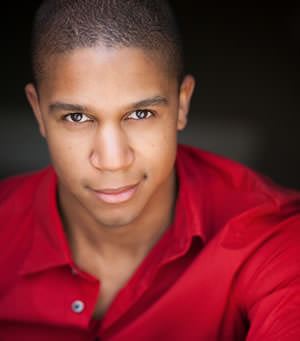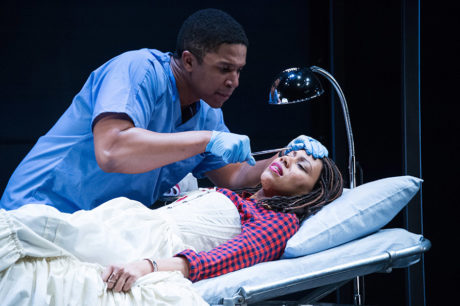I remember thinking after I first saw Lydia R. Diamond’s Smart People at Arena that the character Jaysen Wright plays, Jackson Moore, has an important and particular role in how whole the play plays, especially as Wright interpreted him.
Despite being a very funny comedy, Smart People is built on a serious subject: how human brains are wired to perceive patterns of racial identity in ways that shape discriminatory attitudes and behavior. Wright’s role as an African American medical student puts him in the crosshairs of exactly the stereotyping that the play is about: In the storyline his character is viewed and disparaged as an “angry black man.” And Wright’s challenge on stage includes the fact some in the audience may view his character that way too.
With this in mind, I wrote in my column about the show, “Jaysen Wright captures the role’s complexity with such winning grace that his likability quotient lifts the entire play.” When I re-watched the show a few days later, that initial impression of Wright’s Jackson was not only affirmed, it was augmented. And I became very curious to talk with him about the acting choices he made that led to his performance.

John: Thank you for this interview, Jaysen! I’d like to begin by asking you to tell readers about the character you play in Smart People—what’s he like, what’s his story.
Jaysen: Happy to talk to you, John! My character’s name is Dr. Jackson Moore. He’s in his late 20s and is splitting his time between being a surgical resident at a hospital and treating low-income people at a clinic he runs. He’s driven, proud, caring, smart, and very aware of the societal roadblocks that impede his success.
When you first read the script, what were your thoughts about playing the character of Jackson? Is he like any roles you’ve played before? Did you have any concerns about the role?
I was nervous about playing Jackson because, on the page, he can read as very arrogant, flip, and angry. I definitely wanted to give him as much depth and dimension as he deserved because he’s so much more than angry. I’ve played characters who have dealt with anger before, but Jackson’s reasons are unique, as are the way his anger comes out.
How did your thinking about the character change during the rehearsal process? What direction that you got from Seema Sueko most influenced your performance?
The rehearsal process helped me to find Jackson’s humanity—the reasons he’d react explosively or sardonically. Seema told all of us to fight to be seen and to seek to be loved. That was very helpful.
Jackson has a clear character arc through the play, but he also has a specific and distinguishable relationship with each of the three other characters. What happened in rehearsal as you were finding Jackson in his interactions with them?

While every relationship in Smart People is unique, they all share a push-pull quality. The goal in rehearsal was to find the specificity of when and why you are pushing/being pushed or pulling/being pulled. So in rehearsals I found that Jackson’s push-pull with Valarie [Lorene Chesely] was about immediately connecting with someone and opening up versus not being seen or understood by that person. With Brian [Gregory Perri], it was the push-pull of a great friendship versus the respect that Jackson has for Brian’s work.
Not to slight the other actors’ work in any way—they were all amazing, I thought—but the character of Jackson as written seemed to me particularly tricky. My impression was that the role could easily be performed in a way that would make him a distancing factor for the audience, not a connecting one.
The character himself seems conscious of this. He’s got a speech in which he tells Valerie about an exchange at work with his white supervisor: “Every now and then I don’t feel like being treated like Sambo that day, and I push back, just a little.” But his supervisor “decided that I’m stucky… It doesn’t matter how I say it… I’m ‘angry’ and ‘volatile’ and ‘not good at working with others,’ so I get written up…” That speech seemed to me to be about an instance of Jackson’s being stereotyped as “angry black man,” a near universal experience of young African American men in America, as I understand it.
Well, of course I think Jackson is the trickiest role, but I’m sure my castmates feel their characters are the trickiest! And that’s sort of the joy and complication of this work. I love Jackson and I’m very protective of him. I refuse to let him be dismissed as simply angry. Although I also know that if someone comes to the show and Jackson’s anger is all they walk away with, that says more about how narrowly they are experiencing the world than it does with anything I’m doing.

Would you talk about that “angry black man” stereotype, how you’ve known it to play out in life?
It’s one of the things that I immediately connected to with Jackson because it’s been used against me in my personal life. Someone in a theater once labeled me as “defensive” and “angry,” just in the way that Jackson’s supervisors do. It’s maddening! Because what’s so clever and awful about labeling someone that way is that anything that person now does is in reaction to that label—so it’s hard to defend yourself. And this is something that black men have to deal with every single day, whether someone is openly calling you angry or not. Society has certain cultural assumptions about black men that are difficult to shake, which is why it is so important to have black characters on stage who experience a range of emotions and experiences. We have to smash these incredibly damaging assumptions about black lives.
How do you see that stereotype playing out in this play and this role?
Jackson is exceptionally intelligent and uncompromising. He doesn’t suck up, he doesn’t kowtow—he speaks his mind. This can obviously rub people the wrong way—and we see that happen in the course of the play. Jackson expects the fact that he’s an exceptional doctor who is great with his patients to speak for itself, and when it doesn’t he begins to question things.
Did the topic of that stereotype come up in rehearsal? If so how was it discussed? How did it factor in the acting choices you made?
Oh yes, of course. The way I addressed it was asking, “Well why is he angry? And what is he angry at?” Those questions helped me to start to find the dynamics of Jackson throughout the play.
Smart People ends with an uplifting, hopeful scene set during the first Inauguration of President Obama. Looking back at the eight years that transpired after the play ends, how if at all did Obama’s presidency effect the way the “angry black man” stereotype functions in American life? And how in that regard would you like to see theater make more of a difference?
Well, I think President Obama’s inauguration on its own is incredibly powerful and beautiful, but I’m not sure I find the ending of our show entirely hopeful. I don’t want to spoil the ending for folks who haven’t seen it, but Obama’s ascent can only be viewed as hopeful to a point, considering the monster that succeeds him eight years later. I think our play openly mocks the idea that we are living, or were living, in some sort of post-racial America. As amazing as President Obama was as a leader, it was and is irrational to believe that his presidency would be able to cure all racial ills. Also, who wants to be post-racial? I love my blackness and I don’t want to see it erased or ignored. In any case, we still had an amazing amount of disregard for black lives under Obama, which just goes to show that the struggle will always be there.
Theater needs to continue to reflect society fully. I can’t see shows with all-white casts anymore. I refuse! That’s not the world I live in. My hope is that the depiction of the lives of people of color on stage will be nuanced, surprising, and new.
Why should audiences see Smart People, and what do you hope audiences will take away from it?
Smart People is ambitious, hilarious, surprising, and filled with events that will keep you talking long after you leave the theater. You’ll have a fun and thought-provoking time if you come. My question for audiences after seeing Smart People is: What do you think you just saw and why do you think you saw it that way?
Running Time: 2 hours and 30 minutes, with an intermission.
Smart People plays through May 21, 2017, at Arena Stage – 1101 Sixth Street, SW, in Washington, DC. For tickets, call the box office at (202) 488-3300, or purchase them online.
LINK:
Magic Time!: ‘Smart People’ at Arena Stage at the Mead Center for American Theater by John Stoltenberg
Review: ‘Smart People’ at Arena Stage by Robert Michael Oliver





